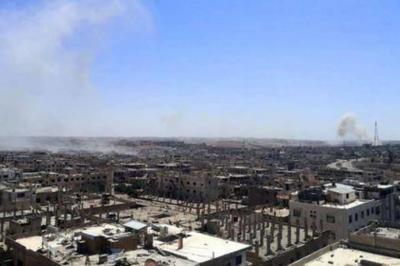Residents and sources from the army and opposition reported that Syrian special forces intensified their attack on a rebel pocket in the southwest of the country, near the borders with Jordan and Israel, on Tuesday, with the assistance of Iranian-backed armed factions. The intensity of the fighting escalated this week after the collapse of a Russian peace plan aimed at avoiding a comprehensive assault on Daraa al-Balad, a pivotal area in the city of Daraa that has challenged state authority since President Bashar al-Assad's forces regained control of its surroundings in Daraa province in 2018.
Witnesses and military sources stated that the Fourth Division of the army, which is loyal to Iran and supported by local armed factions funded by Tehran, fired dozens of homemade rockets at Daraa al-Balad. A ceasefire was announced after Russian generals proposed a new plan that seemed to address some of the armed opposition's demands regarding the involvement of Russian military police in patrols in the pocket, while allowing, for the first time, a Syrian army security presence in their stronghold.
The armed opposition in the area accepted the plan, while the army stated it would respond by Wednesday to the agreement, which also allows the raising of the Syrian and Russian flags in the opposition stronghold but provides assurances from Moscow against allowing Iranian-backed army units to act with impunity.
Army sources indicated that Iranian-backed forces, which had surrounded the urban stronghold of the armed opposition for the past two months and brought reinforcements on Monday ahead of a final assault on the heart of Daraa, would withdraw under the agreement. Daraa al-Balad is the birthplace of the peaceful protests against Assad's rule that erupted a decade ago during the Arab Spring revolutions, which then spread across the country in response to brutal repression by security forces, ultimately escalating into a devastating civil war.
Residents and opposition sources noted that the army's recent campaign followed a series of attacks within the past 24 hours from elements of armed opposition groups on army checkpoints and monitoring points in Daraa, Jassem, and other towns in Daraa province. A source in Western intelligence reported that several thousand families in towns in conflict areas had fled to safer areas near the Jordanian border, where the Jordanian army prepared for a potential new wave of refugees.
The Syrian army reported that at least four soldiers were killed in ambushes against forces in the towns of Al-Sanamin and Nawa, and that shelling from the armed opposition resulted in civilian casualties in residential areas. Government forces, with the help of Russian air power and Iranian-backed armed groups, regained control of Daraa province in 2018 and assured both Israel and the United States at that time that they would prevent Iranian-backed armed groups from encroaching on the border area.
The agreement forced thousands of Western-backed opponents to surrender their heavy weapons but kept Assad's forces out of Daraa al-Balad, which remained under the opposition's control. Tribal leaders reported that members of the armed opposition told Russian mediators they rejected a deadline set by the army overnight to surrender their light weapons and allow forces to set up checkpoints within Daraa al-Balad.
Local officials and residents indicated that Syrian government forces prevented food, medicine, and fuel supplies from reaching Daraa al-Balad but opened a corridor for civilians to leave. The United States and its allies expressed concern over the Syrian army's campaign in Daraa, stating it challenges Russia's pledge to maintain stability and curb Iranian-backed and anti-Israel militant groups. Assad has withstood armed opposition against him and secured control over about 70 percent of the country with Russian and Iranian assistance. However, Idlib in the northwest remains under armed opposition control while areas in the northeast are under Kurdish control.




